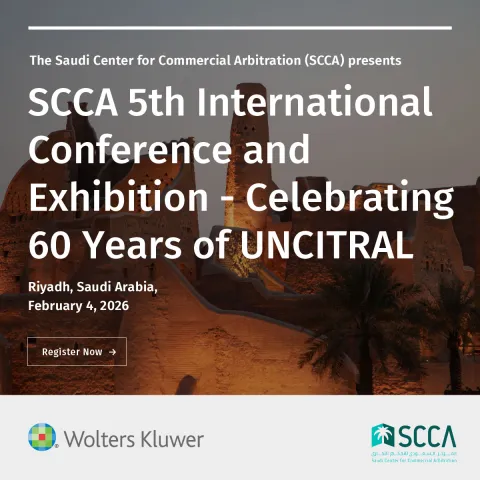SIAC Symposium 2025 Part 1: Safeguarding Arbitration’s Legitimacy in a Divided World
October 9, 2025
Held at the elegant Shangri-La Singapore on 26 August 2025, the Singapore International Arbitration Centre (“SIAC”) Symposium reaffirmed its status as a cornerstone of Singapore Convention Week, combining a distinguished setting with forward-looking content. The morning opened with welcome remarks, and a keynote by Mr Edwin Tong SC (Minister for Law and Second Minister for Home Affairs), who emphasized Singapore’s commitment to international arbitration amid rising geopolitical tensions and shifting global dynamics.
The program focused on key themes shaping the future of arbitration—legal harmonization, technological disruption, and institutional resilience. Two panels anchored the morning: one explored innovation and procedural efficiency; the other addressed ethics, transparency, and professional responsibility. Together, they offered timely reflections on safeguarding arbitration’s legitimacy in a divided world.
A highlight of the symposium was the launch of the SIAC Restructuring and Insolvency Arbitration Protocol (“RIA Protocol” or “Protocol”), a pioneering framework for resolving insolvency disputes through arbitration, underscoring SIAC’s leadership in complex cross-border matters.
Opening Remarks and Welcome Address: Setting the Stage
In her opening address, Ms Gloria Lim (Chief Executive Officer, SIAC) extended a warm welcome to participants from 37 jurisdictions attending the SIAC Symposium 2025. She underscored the positive reception of the newly launched SIAC Rules 2025, noting that users have already embraced the innovative Streamlined Procedure, which is being actively applied in practice. Ms Lim emphasized that the SIAC Secretariat remains committed to incorporating user feedback and continuously enhancing the SIAC Rules to meet the evolving needs of the arbitration community.
Following her remarks, Mr Davinder Singh SC (Chairman, SIAC; Executive Chairman, Davinder Singh Chambers LLC) emphasized that Singapore’s rise as a global arbitration hub—and SIAC’s continued prominence—are rooted in the rule of law, national values, and strong judicial support. He highlighted that Singapore’s soft power lies in trust and legitimacy, which underpin its credibility in international arbitration. Reflecting on his nine years with SIAC, he praised these values as the foundation of the institution’s global standing.
Keynote Address by Mr Edwin Tong SC: Singapore’s Journey and Vision in a Fragmented World
Delivering a keynote that was both reflective and forward-looking, Mr Tong commemorated “SG60,” Singapore’s 60th year of independence, by tracing its transformation from a small trading post to a globally respected, multicultural trading hub. He emphasized that Singapore’s success is rooted in resilience, strategic positioning within the rapidly evolving ASEAN, and a steadfast commitment to the rule of law—qualities that have earned the country growing recognition as a trusted center for international business and dispute resolution.
Mr Tong highlighted the role of institutions like SIAC in upholding these values. He praised SIAC’s inclusive governance and global engagement, noting its merit-based appointments and openness to dialogue as key to Singapore’s rise as a leading arbitration hub.
Addressing today’s volatile global landscape—marked by geopolitical tensions, fractured supply chains, and rising protectionism—Mr Tong underscored the importance of values such as neutrality, integrity, and fairness in maintaining trust in international arbitration. He highlighted the introduction of the RIA Protocol as a well-timed and forward-looking initiative designed to tackle the complexities inherent in cross-border disputes.
Looking ahead, Mr Tong announced that SIAC will establish an Institute of Ethics in International Arbitration, a visionary initiative dedicated to targeted training, research, and engagement on ethical issues in arbitration. This forward-looking endeavor aims to promote ethical standards and strengthen the integrity of international arbitration.
Singapore’s legal strategy, he concluded, is built not just on infrastructure, but on intangible assets such as trust, credibility, and shared values that will shape its future in international law.
Launch of the SIAC Restructuring and Insolvency Arbitration Protocol
The formal launch of the RIA Protocol marked a key moment at the SIAC Symposium 2025, showcasing SIAC’s commitment to innovation in complex commercial disputes. Ms Lucy Reed (President, SIAC Court of Arbitration; Independent Arbitrator, Arbitration Chambers) described the Protocol as the first structured framework for arbitrating insolvency matters, designed to protect asset stability and all classes of creditors to ensure that the assets in an insolvency are used fairly and efficiently. Purpose-built to align with the SIAC Rules, the Protocol incorporates targeted modifications to address the unique challenges of insolvency arbitration.
Consent to apply the Protocol may be given at various stages: before a dispute or an insolvency proceeding, during a restructuring or an insolvency proceeding in court, or on the recommendation of a court or an insolvency professional or liquidator. Unless otherwise agreed, Singapore is designated as the seat and Singapore law governs the arbitration agreement.
To enhance procedural efficiency, the Protocol introduces shortened timelines for responses to notices of arbitration, arbitrator appointments, and challenges. Cases are typically heard by a sole arbitrator, unless complexity warrants a three-member tribunal. Final awards are expected within six months of tribunal constitution. Taken together, these features reinforce SIAC’s focus on speed, clarity, and procedural rigor.
Panel Discussion: Reinforcing the Foundations of International Arbitration Through Innovation
Moderated by Ms Reed, the panel, consisting of Justice S. Mohan (Judge of the High Court, Supreme Court of Singapore), Mr Gaetan Verhoosel KC (Member, SIAC Court of Arbitration; Founding Partner, Three Crowns), Mr Ajey Chandra (CEO, Baker & O'Brien), Ms Koh Swee Yen SC (Head, International Arbitration Practice, WongPartnership LLP), and Ms Nadia Nicolaou (Head of Arbitral Institutions, Opus 2), explored how arbitration must evolve to meet the demands of an increasingly complex global landscape. Ms Reed opened with reflections on earlier practices, where proceedings were marked by simplicity—shorter submissions, concise witness statements, and limited expert testimony.
The panel emphasized the critical role of proactive tribunal management and technical literacy in modern arbitration. Arbitrators must not only grasp the legal framework but also engage substantively with the technical dimensions of disputes. Techniques such as hot-tubbing and joint expert testimony were highlighted as effective tools for streamlining proceedings and clarifying complex issues. Panelists agreed that arbitrators should be trained and equipped to independently assess technical matters, navigate divergent expert opinions—often based on differing datasets—and evaluate their relevance with precision.
Artificial intelligence (“AI”) was highlighted as a transformative force in arbitration. While not a substitute for legal judgment, AI can support tribunals by reducing administrative burdens—drafting procedural histories, organizing case materials, and assisting with timelines. Its role is expected to grow, particularly in enhancing efficiency and freeing up time for substantive deliberation.
The panel explored document-only proceedings, exemplified by SIAC’s Streamlined Procedure, and highlighted page and word limits as effective tools to reduce costs and improve access to justice, particularly in small claim arbitrations. As arbitration continues to adapt to technological and procedural shifts, the discussion reaffirmed that its legitimacy must remain rooted in fairness, neutrality, and the rule of law.
Panel Discussion: Building Trust in a Fragmenting World—The Role and Development of Ethics in International Arbitration
This distinguished panel, comprising Ms Olufunke Adekoya (Member, SIAC Court of Arbitration; Independent Arbitrator and Litigation Consultant, Funke Adekoya & Company), Ms Jessica Fei (Member, SIAC Court of Arbitration; International Partner, King & Wood Mallesons), Mr Jean-Rémi de Maistre (CEO & Co-Founder, Jus Mundi), Mr Kelvin Poon SC (Deputy Managing Partner, Head, International Arbitration, Rajah & Tann Singapore LLP), and Mr Paul Sandosham (Partner, Clifford Chance & Managing Partner, Cavenagh Law), was expertly moderated by Mr Thomas R. Snider (Member, SIAC Court of Arbitration; Partner & Head of International Arbitration, Charles Russell Speechlys). Together, they addressed the evolving ethical landscape of international arbitration, focusing on how trust and integrity can be preserved amid increasing global fragmentation and technological disruption. The discussion opened with a comparative look at witness preparation, highlighting that its permissibility varies widely across jurisdictions. Panelists agreed that the applicable standards ultimately govern the boundaries of acceptable practice, underscoring the need for cultural and legal sensitivity.
A key theme was the independence of experts. The panel stressed that experts must serve the tribunal—not the parties—and avoid becoming partisan advocates. To safeguard neutrality, expert questioning should be conducted by the full tribunal, with private exchanges discouraged to maintain procedural fairness.
In today’s AI-driven legal landscape, transparency around the use of artificial intelligence was identified as essential. Counsels are expected to disclose whether, and in what manner, AI tools were utilized in the preparation of their submissions. Likewise, arbitral tribunals should be transparent about any use of such tools. The panel identified permissible uses of AI in arbitration, including administrative tasks such as indexing and grammar checks. AI-assisted legal research was compared to consulting legal texts, with the discussion reflecting a shared understanding that such applications must remain within ethical boundaries.
On third-party funding, the panel reaffirmed SIAC’s requirement for early disclosure, especially regarding any potential conflicts of interest. To uphold the integrity of proceedings, any grounds for challenging an arbitrator must be disclosed as early as possible, reinforcing the mantra: disclose, disclose, disclose.
Ultimately, the panel concluded that ethics in arbitration are not static. They must evolve in step with technological advances, jurisdictional diversity, and the growing expectations of fairness and transparency in international dispute resolution.
Closing Reflections: Lessons Learned From the Morning at the SIAC Symposium 2025
The morning sessions of the SIAC Symposium 2025 offered a compelling blend of strategic vision and practical insight, reaffirming SIAC’s role at the forefront of international arbitration. From the keynote by Mr Tong to the launch of the RIA Protocol, the discussions underscored the importance of resilience, innovation, and ethical leadership in a rapidly evolving global landscape. The panels on procedural innovation and ethics highlighted the need to balance efficiency with integrity, embrace AI responsibly, and maintain transparency across jurisdictions. As arbitration faces rising geopolitical tensions and technological disruption, the SIAC Symposium made clear that the future of arbitration depends on a steadfast commitment to fairness, cooperation, and the rule of law—principles that Singapore and SIAC continue to champion with clarity and conviction.
You may also like











